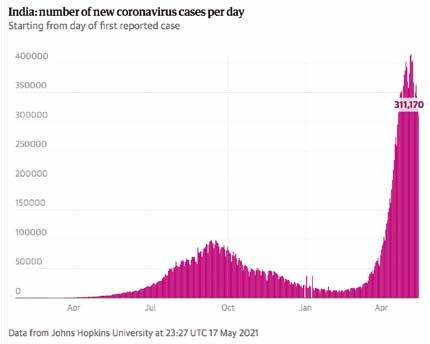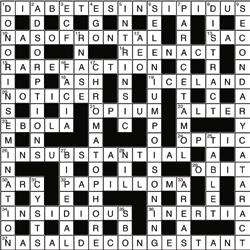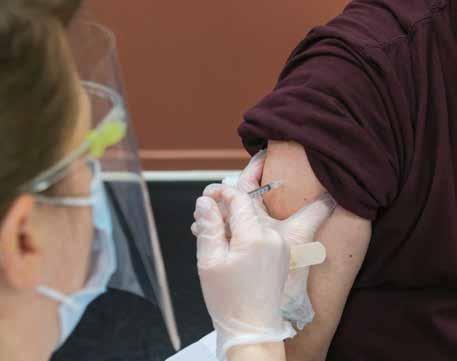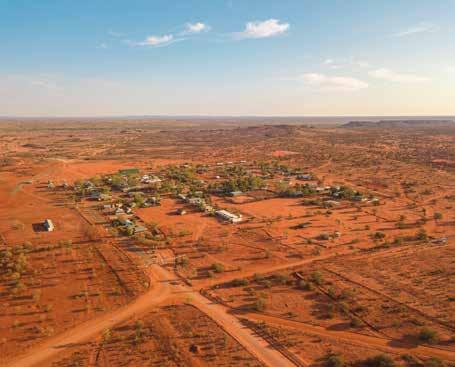
10 minute read
News in brief
INDIA
The World Health Organization (WHO) says India’s deadly COVID-19 second wave was caused by a “perfect storm” of mass gatherings, low vaccination rates and more contagious variants.
In mid-April in Haridwar, an Indian temple town that hosts the Kumbh Mela, a Hindu festival that is the world’s biggest religious gathering, between one and three million people came together to take a ritual dip in the Ganges. At the same time, many Muslims were celebrating Ramadan with their friends and families. Indian Prime Minister Narendra Modi was also encouraging massive election rallies after declaring the pandemic had reached its “endgame” in March. WHO says this “complacent behaviour”, allowing mass gatherings after a relatively successful management of the COVID first wave, had played a major role in the devastating second wave. India has been hit by a highly infectious variant of COVID-19, the so-called “double mutation” or B1617 variant, and it also has weak health infrastructure. WHO Director-General, Tedros Adhanom Ghebreyesus, said: “The situation in India is beyond heartbreaking.” India’s catastrophe has had dire consequences for other poor countries. The world’s biggest producer of vaccines, the Serum Institute of India was supposed to supply doses to developing nations, especially in Africa. But the export of doses dropped precipitously in April when it shipped 1.2 million doses abroad compared with 64 million in the previous three months.
‘The incidence is almost vertical. This can happen in any country if we let our guard down. We are in a fragile
situation.’ — Dr Maria Van Kerkhove, Technical lead, WHO Emergency Program
WORLD
Science dazzles but not enough benefit
One year on, the scientific advances to combat the pandemic have been breathtaking, but the rollout to vulnerable countries is not nearly fast enough. A year ago, the collective understanding of COVID-19 was limited; there were no rapid tests, no vaccines, and little was known about effective treatments. April saw the first anniversary of the World Health Organization-led ACT-Accelerator – a scheme to develop and deliver the tests, treatments and vaccines the world needs to fight COVID-19. Today, rapid diagnostic tests, repurposed treatments and vaccines exist. This scientific progress has been rapid and unprecedented in scale and levels of collaboration. However, the scheme remains grossly underfunded. “World leaders face a choice: invest in saving lives by treating the cause of the pandemic everywhere, now, or continue to spend trillions on the consequences with no end in sight,” said WHO DirectorGeneral Dr Tedros Adhanom Ghebreyesus. The explosion of COVID in India has highlighted the weak spot in efforts to control the pandemic – the vulnerability of low- and middle-income countries – which puts the whole world at risk. “COVID-19 knows no borders,” said WHO Special Envoy, Carl Bildt. “A new variant from anywhere could unravel progress everywhere, even in a country that has achieved 100 per cent vaccination. The pandemic is still on the rise. “Only a reinforced global effort to deliver tests, treatments and vaccines to all people everywhere, based on need rather than ability to pay, will bring an end to this pandemic.” ‘A new variant from anywhere could unravel progress everywhere.’
UNITED STATES
Biden puts $400 billion into home-based care
The US President’s $2 trillion stimulus package for US jobs and infrastructure includes $400 billion over eight years for home-based, long-term healthcare services. Economic commentators point out that Biden deliberately included the investment in care as part of the economic agenda, arguing that it would create better, higher-paying jobs and unleash untapped potential for growth. “This is an absolutely critical piece of the package. We think of it as core to our nation’s infrastructure,” said Heather Boushey, a member of the White House Council of Economic Advisers. If implemented in full, it would represent the single largest investment in home- and community-based services for disabled and older people in American history. The plan, however, is expected to face fierce opposition from the Republican Party. The plan outlines how caregivers would receive “a long-overdue raise, stronger benefits and an opportunity to organise or join a union”. The inclusion of the home-care funding – close to twice current expenditures – came after intense lobbying by the SEIU, the union that represents more than one million caretakers. According to the SEIU, the median salary for a homecare worker is approximately $17,200 a year. More than half of home-care workers are on some form of public assistance such as food stamps. They are overwhelmingly female and far more likely to be people of colour than the general population.
CROSSWORD SOLUTION

Call the NSWNMA on 1300 367 962
Quality legal advice for NSWNMA members

• Workers Compensation Claims • Litigation, including workplace related claims • Employment and Industrial Law • Workplace Health and Safety • Anti-Discrimination • Criminal, including driving offences • Probate / Estates • Public Notary • Discounted rates for members including
First Free Consultations for members
Offices in Sydney and Newcastle with visiting offices in regional areas (by appointment)

AUSTRALIA
Aged care vaccine rollout “an absolute debacle”
By the end of April, barely 10 per cent of Australia’s 330,000 aged care workers had been vaccinated, though they are classified in the 1a group for the highest priority frontline staff.
Fewer than one-third of aged care facilities had administered both doses of the COVID19 vaccine to their residents eight weeks into the program, as logistics companies fail to deliver the vaccines, health providers fail to show up and the vast majority of workers have no clear access to vaccinations, the Sydney Morning Herald (SMH) reported. One major aged care provider told the SMH that the rollout was “an absolute debacle”. Aged care providers told the SMH that their workers did not have access to the NSW Health-operated hubs that vaccinate the highest priority groups, such as frontline medical workers and hotel quarantine staff, because aged care falls under the federal government. NSW Health confirmed this. The Morrison government said its initial strategy of inoculating staff at their workplace was “under review”. The federal government had planned to send dedicated teams to aged care facilities to vaccinate staff and to establish offsite “pop-up” vaccination hubs. The ACTU said the government walked away from these commitments. “These workers were told they would be treated with the same urgency and attention as other frontline health staff, but many will end up waiting six months to be vaccinated,” said ACTU Assistant Secretary Liam O’Brien. ‘Aged care workers did not have access to the NSW Health-operated hubs because aged care falls under the federal government. ’
UNITED KINGDOM
British nurse fined £10,000 for 1 per cent pay protest
Sixty-one-year-old nurse Karen Reissmann is hammered with a £10,000 fine, despite taking all precautions to ensure her protest was COVID-safe. Karen and 40 colleagues were protesting in St Peter’s Square, Manchester, against the government’s one per cent pay rise for NHS workers. She has worked as a frontline nurse throughout the pandemic, and was handed the fine in March despite offering a risk assessment of her protest to Greater Manchester Police (GMP) and ensuring it was COVID-safe. She had limited the number of protesters to guarantee social distancing. GMP assistant chief constable, Nick Bailey, said the force’s lawyers had reviewed the £10,000 (A$18,000) fine and were “satisfied that the issue was proportionate, legal, accountable and necessary in the circumstances”. Karen, who has been a nurse for 39 years, told The Guardian: “Somebody calculated that if I used my one per cent pay rise, it would take me 56 years to pay off the fine.” Karen said she believed the force’s desire to prosecute was meant to intimidate other nurses from organising protests. “It’s so punitive; clearly designed to stop others. I know people who stepped back from protesting because they were afraid of the £10,000 fine,” she said. ‘It’s so punitive, clearly designed to stop others.’
AUSTRALIA
Climate change to drive a third of doctors out of the Northern Territory
New research published in The Lancet Planetary Health found 34 per cent of doctors have already or are likely to consider leaving the NT because of climate change. The authors, from the Australian National University, say: “This would leave a large gap in the territory’s healthcare system, which already suffers from a fast turnover of staff. These doctors would leave behind communities already suffering from the effects of climate change.” Twenty-five per cent of doctors working in the NT responded to the survey. The study showed NT doctors believe climate change is a serious public health issue. A total of 85 per cent indicated climate change has already or is likely to negatively impact their patients’ health; 74 per cent believed climate change is already causing or is likely to cause parts of the NT to become uninhabitable. And for 34 per cent, climate change has already, or is likely to, make them consider leaving the NT. The two summers of 2018–20 were the hottest ever recorded in the NT. From December 2019 to January 2020, temperatures were about 4°C above the long-term average. In late 2019, it was so hot, remote kidney dialysis centres struggled to say cool enough for their life-saving dialysis machines. Some of the hottest conditions in 2019 were in the Katherine region, which shattered previous records. In 2019 there were 54 days of 40°C or above in Katherine. ‘This would leave a large gap in the territory’s healthcare system.’

COLUMBIA
ACTU condemns Colombian government violence
The Colombian government has responded with brutal repression to widespread civil unrest that started with a national strike organised by the Colombian union movement.
As The Lamp went to press, police and military units had killed more than 40 protestors. According to reports from human rights organisations, by 10 May there had been more than 1089 cases of violence, 726 arbitrary detentions, 234 wounded, five demonstrators had disappeared and six women raped by ESMAD soldiers (Escuadrón Móvil Antidisturbios – the Mobile AntiDisturbances Squadron). Working people, led by an alliance of trade unions and social groups, have taken to the streets daily since the national strike on 28 April to oppose a tax reform bill, which would have increased inequality by disproportionately impacting workers and the poor, who were already struggling with the economic impacts of COVID-19. More than 80,000 people have died from COVID in Colombia. In a letter to the Colombian President, Ivan Duque, the ACTU said: “The Australian union movement stands in solidarity with the workers in Colombia who have taken the brave decision to continue with peaceful demonstrations in line with the decisions of the Comité Nacional del Paro (National Strike Committee). “Colombia is already the most dangerous place in the world to be a trade unionist, with more than 3000 trade unionists murdered since 1989. Most of these crimes remain unresolved, as your government has failed to address the culture of impunity.”
NEW MEMBER BENEFIT
Access to online Professional for NSWNMA members! FREE Education
Meeting your Continuing Professional Development (CPD) obligations* is now even easier with this great new offer for NSWNMA members. As a financial member you’ll have access to 61 online courses absolutely free.

FEATURING
Access to over 20 hours of FREE CPD* 61 topics including those modules that are deemed mandatory annual competencies by large health organisations and nursing agencies* Free professional development portfolio to provide evidence to the Nursing and Midwifery Board of Australia (NMBA) of participation in CPD annually Access free webinars on a range of topics
LOGGING ON
MEMBERS: New users create a ONE-TIME login to the website. NON-MEMBERS: Join the union at www.nswnma.asn.au and receive access to your 20 hours of FREE CPD!


